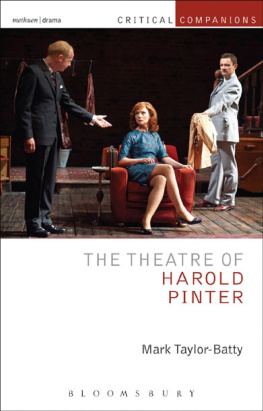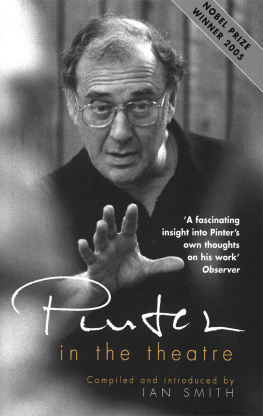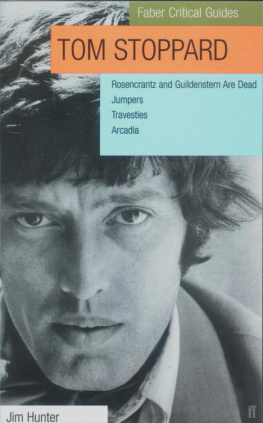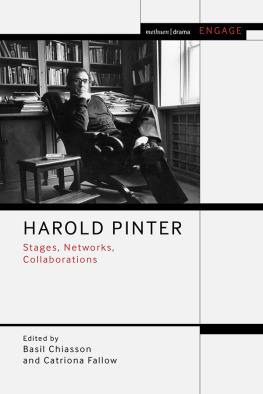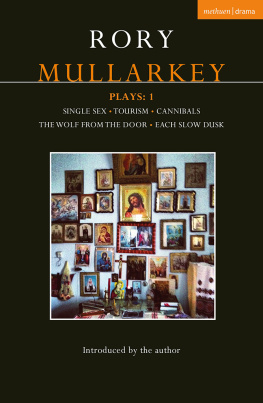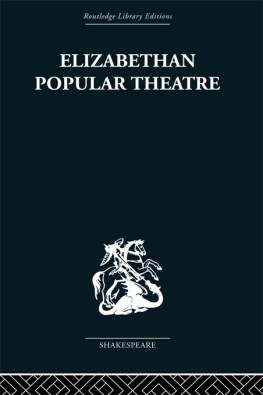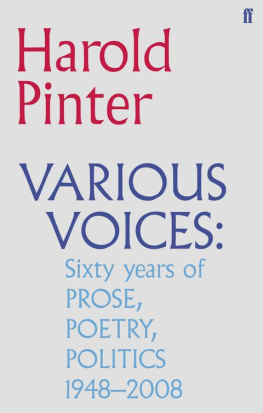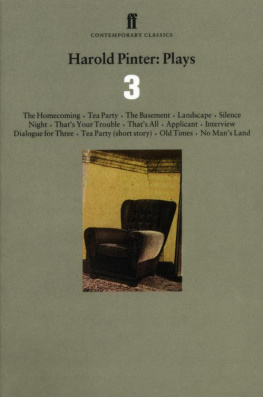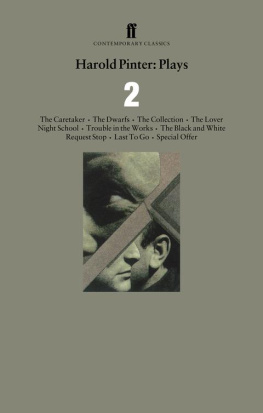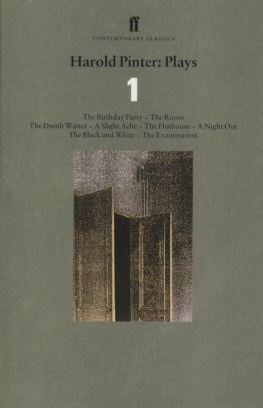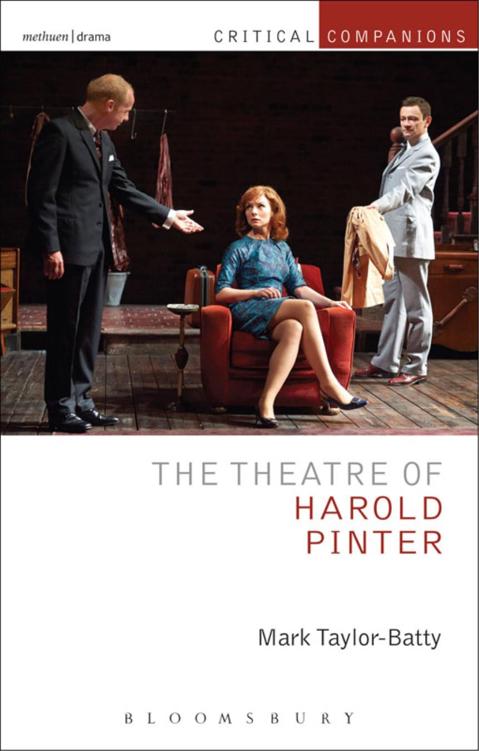THE THEATRE OF HAROLD PINTER
Mark Taylor-Batty is Senior Lecturer (Associate Professor) in Theatre Studies at the University of Leeds. He is an executive member of the Pinter Society. He assisted the author in the construction of his official website, haroldpinter.org, and authored two sections of that site. His publications include About Pinter: The Playwright and the Work (2005), Roger Blin: Collaborations and Methodologies (2007) and, with Juliette Taylor Batty, Samuel Becketts Waiting for Godot (2008). He is an associate editor of the Performance Ethos journal (Intellect) and, together with Enoch Brater, he is series editor of Bloomsbury Methuen Dramas Engage series of books.
In the same series from Bloomsbury Methuen Drama:
THE PLAYS OF SAMUEL BECKETT
by Katherine Weiss
THE THEATRE OF CARYL CHURCHILL
by R. Darren Gobert
THE THEATRE OF MARTIN CRIMP (SECOND EDITION)
by Aleks Sierz
THE THEATRE OF BRIAN FRIEL
by Christopher Murray
THE THEATRE OF DAVID GREIG
by Clare Wallace
THE THEATRE AND FILMS OF MARTIN MCDONAGH
by Patrick Lonergan
MODERN ASIAN THEATRE AND PERFORMANCE 19002000
by Kevin J. Wetmore, Siyuan Liu and Erin B. Mee
THE THEATRE OF SEAN OCASEY
by James Moran
THE THEATRE OF TENNESSEE WILLIAMS
by Brenda Murphy
THE THEATRE OF TIMBERLAKE WERTENBAKER
by Sophie Bush
For Anna, Gabriel and Samuel
THE THEATRE OF HAROLD PINTER
Mark Taylor-Batty
Series Editors: Patrick Lonergan and Erin Hurley
CONTENTS
Acknowledgements
Introduction
Invasions and Oppressions
Awkward Investments in Enclosed Spaces: The Room , Th e Birthday Party , The Dumb Waiter , The Hothouse
The Stranger on the Threshold: A Slight Ache , The Caretaker
The Company of Men and the Place of Women
The Male Church: The Dwarfs
Untenable Archetypes: A Night Out , Night School , The Collection , Tea Party
Negotiations and Contracts: The Lover , The Homecoming
Present Continuous, Past Perfect
Contours and Shadows: Landscape , Silence , Old Times
A Foreign Country: No Mans Land
The Impossible Family
Exiled: Monologue , Betrayal
Other Places: Victoria Station , Family Voices , A Kind of Alaska , Moonlight
Family Under Threat: One for the Road , M ountain Language , Party Time , Celebration
Politics and the Artist as Citizen
Anger and All That: The Birthday Party , The Dumb Waiter , The Hothouse
Art, Truth and Politics: The Nobel Lecture, Precisely , The New World Order , Press Conference , Celebration
The Fist and the Kiss: Ashes to Ashes
Some Concluding Remarks
Critical and Performance Perspectives
The Curse of Pinter Harry Burton
Who the Hells That?: Pinters Memory Plays of the 1970s Chris Megson
Revisiting Pinters Women: One for the Road (1984), Mountain Language (1988) and Party Time (1991) Ann C. Hall
Pinters Political Dramas: Staging Neoliberal Discourse and Authoritarianism Basil Chiasson
Chronology
Notes
Bibliography
Notes on Contributors
Index
ACKNOWLEDGEMENTS
I am grateful to those who have provided supportive contexts for me to pursue my study of and transmit my passion for Pinters works in recent years: Mareia Aragay, Francis Gillen, Tali Itzhaki, Toma Oni, Craig N. Owens, Avraham Oz, Sandra Paternostro, Enric Monforte Rabascall, Linda Renton and, importantly, Mark Dudgeon at Bloomsbury Methuen Drama. My work with Basil Chiasson and James Hudson kept an intellectual engagement with this body of work alive over particularly difficult periods. Basil contributes a chapter to the final section of this book, and Im grateful to him and my other contributors Harry Burton, Ann C. Hall and Chris Megson for adding depth to this work. Thanks go to Ewan Jeffrey for his excavation of family structures in Pinters writing; the intellectual genesis of the chapter on family in this volume is owed to him. I also want to acknowledge all the students on my Theatricalities module over the years, who continue to shine fresh lights into the corners of these dramas. I am particularly grateful to Patrick Lonergan, whose generous and helpful comments on the draft manuscript were invaluable. Many thanks to all the Facebook friends who responded online to my general queries over cultural and political history, especially Sara Allkins, Clementina Angelina, Alex Chisholm, Paul Kleiman, Caitrin OSeaghdha and David Whitaker. I remain grateful for the trust that Harold Pinter demonstrated, and for the support of Antonia Fraser. Thanks especially go to Juliette Taylor-Batty, for her comments on drafts, and for all her strength and care.
Quotations from the work of Harold Pinter are reproduced with the kind permission of Faber and Faber and Grove Press.
INTRODUCTION
In announcing the recipient of the 2005 Nobel Prize for Literature on 13 October of that year, Horace Engdahl, the Permanent Secretary of the Swedish Academy, came through a gilded white door to meet the gathered media and announced first in Swedish, then in English, French and German:
The Nobel Prize in Literature for 2005 is awarded to the English writer Harold Pinter, who in his plays uncovers the precipice under everyday prattle and forces entry into oppressions closed rooms.
This brief justification for giving the award to Pinter that year focussed on his dramatic writing, and made reference to his reputation for artistic representation of everyday casual language, the threat of some hollow, ominous space that such language obscures or avoids, his frequent use of enclosed spaces, and his foregrounding of repressive interpersonal or state behaviours. This book will examine some of those precipices, that prattle and oppression, and will consider other important aspects of Pinters work, including his aesthetic interest in the fragility of memory, the concerns over trust and betrayal, male companionship, the complications in friendships and sexual relationships, representations of family, and the abuse of language to territorial, emotional or political ends. As such, one of the purposes of a volume such as this is to clarify what is distinctive or important about the writing style of the author whose work it is surveying and offer some appreciation of the contours of the legacy he leaves behind. In the case of Harold Pinter, we are examining an author who has been perceived to have influenced the art of the playwright itself. David Hare admired his alarming range, adding that he can play great, big major chords made up only of anger, indignation and contempt. Edward Albee articulated his admiration for Pinters active aggression against the status quo and lauded his extraordinary ear, describing him as a composer. David Mamet noted that, as a young man, Pinter was his hero and really was responsible to a large extent for me starting to write. Patrick Marber recalls being mesmerised by the 1980 National Theatre production of The Caretaker and spoke of how it was one of the things that inspired me to work in the theatre. Ariel Dorfman pointed out how he showed me how dramatic art can be lyrical without versifying, can be poetic merely by delving into the buried rhythms of everyday speech. Sarah Kane cited Pinter, alongside Howard Barker and Edward Bond, as writers she was particularly keen to learn from, and Barker and Bond had, in their turn, acknowledged the importance of the older writer, while maintaining their own distinctive approaches. Even Arthur Miller, Pinters senior, acknowledged that he could not have been exposed to Harold Pinters work and not learned anything from it. Pinters achievements as a writer are integral to any appreciation of late twentieth-century British theatre.

